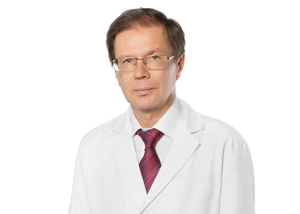| |
Russian remote
rehabilitation technology to
be presented at the Eurasian
Orthopedic Forum 2017 in
Moscow
Special Interview
(Moscow) -
During the upcoming Eurasian
Orthopedic Forum (29-30 June
2017, Moscow), a
number of workshops will be
presented on leading edge
practices in various areas
of orthopedic traumatology
to include remote-control
rehabilitation. In a special
interview, Professor
Konstantin Lyadov, Member of
the Head Russian Academy of
Sciences, Director of the
Medsi Group Treatment
Cluster, and Head of the Research
Team talks about the latest
innovations being
developed in Russia.
Konstantin, why did you
decide to develop this
remote rehabilitation
technology?
The need was long overdue.
Traumatologists and
orthopedists have taken hold
of ever increasing number of
effective surgery techniques
using cutting-edge
technologies. However, we
need to ensure that results
are retained and
physical/psychological
recovery is taken care of
postoperatively. The issue
goes full-blown when the
patient gets discharged, but
cannot visit rehabilitation
center because of the
mobility limitations.
Furthermore, not every
center can boast qualified
professional rehabilitation
staff. The idea that
patients can do
rehabilitation exercises at
home on their own is wrong.
Please, tell us about the
organization of remote
rehabilitation?
We named the technology
remote-control
rehabilitation, as it is
based on continuous online
control of the process by an
instructor. To begin with,
we use special routine to
select patients. After that,
a medical professional and
medical technicians come to
the patientís house to
install special medical
equipment and everything for
Internet video conference
calls. They instruct the
patient and patientís
relatives on the
rehabilitation process. We
design a 21-day program and
schedule the time when the
patient and the instructor
meet online. The instructor
makes the patient feel
constant support, as the
latter can always ask any
question that is bothering
him or her, and the
instructor will refer the
issue to the respective
specialist (a clinical
psychologist, speech
therapist, neurologist,
endocrinologist,
physiotherapist, etc.) to
discuss results and adjust
the physical activity level.
After the rehabilitation
period is over, a group of
medical professionals
estimate the obtained
results based on an
international scale. In
addition, they visit the
patient at home on the last
day of rehab to examine and
estimate his/her condition,
which is followed by
equipment removal.
What group of patients is
this method intended for?
It is intended for a wide
range of motor and cognitive
disorders. We used it to
help patients after strokes
and arthroplasty, severe
brain and spinal cord
damage, complex hip/upper
limb/shoulder surgeries.
Using this method, we cut
in-patient care costs
keeping the care quality
unaffected and making the
rehabilitation more
comfortable for the patient,
as it takes place at home.
According to our estimates,
2-week-long rehab for the
second stage in Russia
requires 44 to 48 thousand
rubles (US$ 740-807), while the remote
rehab course takes only 22
to 24 thousand rubles (US$
370-403).
Remote control makes rehab
available for many more
patients, saves time, funds
and other resources that can
be, thus, allocated to the
patients with the most
severe cases needing
second-stage in-patient
rehabilitation. On the other
hand, the technology may be
used in surgical, gerontological centers,
sanatoriums, nursing homes
for the elderly, as well.
Are there any similar
technologies?
No, itís unique for Russia
and has no rival in the
world. We made our first
international presentation
of the technology two years
ago, during a conference in
Glasgow, and our foreign
colleagues doubted its
economic feasibility
suggesting remote
instructorís work will be
very expensive to organize.
However, we proved social,
clinical and financial
efficiency of the
technology. Development of
all the methodological
solutions is complete. We
are sure that remote-control
medical rehabilitation can
successfully replace a
certain part of in-patient
services and are willing to
share the experience. There
is a number of medical
areas, where Russia leads
and the world follows. I
hope, remote rehabilitation
will become one of them.
Moreover, innovative mobile
equipment was designed by
Russian engineers especially
for this method.
What innovative features
does the equipment have?
Ortorent Production Company
cooperating with our
research group offers a
complex solution for
remote-control
rehabilitation. It also
provides technical support
of the project in Russia.
Currently, there is a
15-machine series for
mechanic therapy to restore
motor function using special
software. We plan to further
expand the series. The
machines are different from
similar imported devices, as
they are able to generate
treatment regimen records
giving feedback to both the
patient and the doctor. It
can be used for a patient of
any height, even a child,
and set to change physical
activity level via remote
control. The manufacturer is
going to obtain CE
certificate soon. Then,
export to Europe will be
allowed.
How many Russian patients
have already completed the
remote rehab course?
According to Ortorent, about
2,500 patient have completed
the rehab using their
equipment during 4 years of
the project development. We
started using the technology
in Moscow in 2013. The
project was supported by the
Department of Labor and
Social Protection of Moscow.
In November 2016, we
successfully introduced the
remote rehab to the Reshma
Medical Centre under the
Federal Medical and
Biological Agency of Russia
in the Ivanovo Region. Since
spring 2017, the doctors of
Tatarstan have been
mastering the method. Then,
the doctors of the Perm
Region joined them. The
Tyumen Region and some other
Russian entities expressed
their interest, too. We are
sure to see explosive
development of remote
rehabilitation in the next
2-3 years. Especially, since
the Telemedicine Law was
passed in Russia and the
Russian Ministry of Health
resolved to cover
long-distance consultation
services by compulsory
medical insurance, as they
saw its efficiency and now
intend to provide us
comprehensive support.
Please, tell us what are the
priorities of the research
group in further development
of the technology.
Currently, we are working on
maximizing its availability
via use of mobile
communications. Cooperating
with the International
Telecommunication Union, we
have already designed a
special solution and entered
into a program testing
agreement. It will allow
using smartphones in
addition to video conference
and dedicated lines. Images
from the smartphones will be
transmitted to a computer
screen, where the patient
and the instructor will see
each other. However, it
requires a special QC system
that would assure the
process efficiency and
safety.
 PRINT
THIS ARTICLE
PRINT
THIS ARTICLE
|



